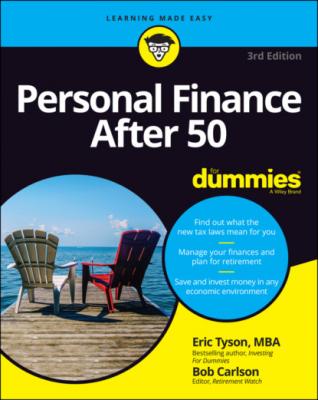Personal Finance After 50 For Dummies. Eric Tyson
Читать онлайн.| Название | Personal Finance After 50 For Dummies |
|---|---|
| Автор произведения | Eric Tyson |
| Жанр | Личные финансы |
| Серия | |
| Издательство | Личные финансы |
| Год выпуска | 0 |
| isbn | 9781119724087 |
iShares MSCI EAFE Index (EFA): An ETF that invests to replicate the performance of the MSCI EAFE Index.
Assessing and changing your portfolio
Although we advocate doing your homework so you can buy and hold solid investments for the long haul, we do at times support selling when it’s appropriate. If you have investments that seem to be doing poorly over an extended period of time, try determining why they haven’t done well and look at making changes to your portfolio.
However, when assessing your current holdings be careful that you don’t dump a particular investment just because it’s in a temporary slump. Even the best investment managers have periods as long as a year or two during which they underperform. Sometimes this happens when the manager’s style of investing is temporarily out of favor. But remember, our definition of “temporary” isn’t measured in days or months; instead, we mean one to two years.
Losses can help reduce your income taxes. You can see immediate tax relief/reduction for nonretirement losses.
Consider opportunity cost. Consider what kind of future return that money could be providing you with if you switched into a better investment.
As you manage your portfolio:
Don’t become attached to your investments. Over the years, Eric has worked with many clients who have difficulty being objective with and letting go of investments. Just as we get attached to people, places, and things, some investors’ judgments may be clouded due to attachment to an investment. Even if an investor makes the decision to sell an investment based on a sound and practical assessment, his attachment to it can derail the process, causing him to refuse to part with it at the current fair market value. Attachment can be especially problematic and paralyzing with inherited assets.
Don’t let inertia become a problem for you. It wasn’t unusual for Eric to work with clients who have accumulated tens or hundreds of thousands of dollars in checking accounts. Folks who amassed their savings from work income were often fearful of selecting an investment that may fall in value. These people knew how long and hard they had to work for their money, and they didn’t want to lose any of it.
Конец ознакомительного фрагмента.
Текст предоставлен ООО «ЛитРес».
Прочитайте эту книгу целиком, купив полную легальную версию на ЛитРес.
Безопасно оплатить книгу можно банковской картой Visa, MasterCard, Maestro, со счета мобильного телефона, с платежного терминала, в салоне МТС или Связной, через PayPal, WebMoney, Яндекс.Деньги, QIWI Кошелек, бонусными картами или другим удобным Вам способом.
